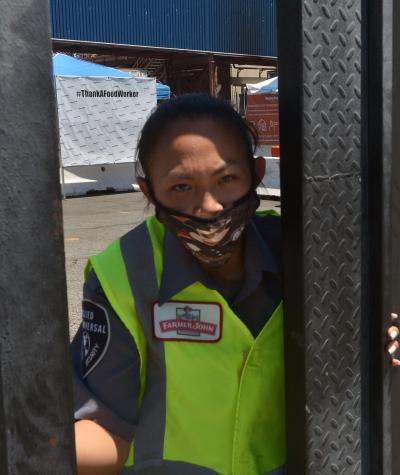Amid the ongoing coronavirus pandemic and related economic crisis, executives in the meatpacking industry have poured millions of dollars into our political system to curry favor with powerful politicians in an effort to protect their own interests at the expense of their employees.
A dangerous workplace even before the pandemic, meatpacking plants have proven to be breeding grounds for the spread of the virus. Outbreaks have been reported at facilities across the country, from North Carolina to South Dakota, from Nebraska to Missouri, and from Iowa to Texas.
According to the Center for Disease Control (CDC), which looked at 239 facilities in 23 states, there were 16,233 confirmed cases among meatpacking workers, and 86 deaths in April and May alone. Eighty-seven percent of those who died were people of color.
The crisis has spurred lawsuits by, or on behalf of, workers who allege that meatpacking plants have failed to adequately protect them from contracting the virus.
In response, the industry and its executives have used money and influence to advocate for their own protection, asking the government to limit the ability of employees to file workplace safety-related lawsuits.
Big meatpacking companies have spent hundreds of thousands of dollars lobbying Congress and the White House in recent months on coronavirus-related issues, including corporate immunity and workplace safety.
They’ve also lobbied the Occupational Safety and Health Administration (OSHA), the federal agency charged with protecting worker safety, which has been accused of siding with the industry over workers.
For example, Smithfield Foods reported paying lobbying the firm Holland & Knight $230,000 in the second quarter of 2020 to lobby Congress on “liability provisions related to COVID-19,” lobby OSHA and other federal agencies on “worker safety issues related to COVID-19,” and lobby the White House and others on “issues related to COVID-19 in the meatpacking industry,” among other matters.
Tyson Foods, Inc. reported spending $324,977 on lobbying activity in April through June, including on “labor issues.”
Those influence efforts were supplemented by millions of dollars in political contributions from industry CEOs. As Campaign Legal Center (CLC) reported in July, industry leaders have been major donors to Trump and the Republican party.
Tyson Foods Chairman, John Tyson, has given more than $90,000 to the Republican party since 2017. Joe Sanderson Jr., CEO and Chairman of Sanderson Farms, has given more than $60,000 to Republican party committees, campaigns, and super PACs since 2015.
Just this year alone, Mountaire Farms CEO Ronald Cameron has made over $3.45 million in contributions, including $2 million to the Koch-aligned super PAC Americans for Prosperity Action plus six figures each contributions to the Club for Growth and Trump’s approved super PAC America First Action.
He has also given big money to the joint fundraising PAC Trump Victory and various other Republican party and candidate committees.
When the Trump administration announced their “Great American Economic Revival Industry Groups” in April, Tyson President Dean Banks, Perdue Farms, Inc. CEO Randy Day, and Mountaire’s Cameron were all named as members.
It appears that the money the meatpacking industry has spent on political contributions and lobbying efforts has paid off.
Industry executives scored an early win in April, when President Trump signed an executive order that he claimed would “solve any liability problems” for meatpacking plants. Trump said that he worked with Tyson Foods on the order—an extraordinary example of beneficial access and influence for megadonor John Tyson.
Trump overstated the impact of the executive order. It doesn’t completely shield the meat industry from liability—that would take an act of Congress.
However, industry leaders seem to be in luck. Senate Majority Leader Mitch McConnell has pledged that the Senate will not pass a new COVID-19 relief bill unless it includes corporate immunity protections, a push supported by the meatpacking industry and other powerful corporate interests.
It should be noted that while industry leaders have argued that liability protections are necessary to maintain domestic food supply during the pandemic crisis, meat exportation has soared in recent months. American companies sent record-high totals of pork to China in April.
The Trump administration has even intervened to keep individual meatpacking plants open. For example, when Colorado officials forced a JBS Greeley plant to close after a major outbreak, executives contacted the White House for help.
Within days, Vice President Pence stepped in and pushed to get the facility reopened, according to The Washington Post.
Meatpacking workers are the most at risk, but the average wage in the industry is $14 per hour. Against the multi-millionaire and billionaire executives in the industry, workers have a clear disadvantage in making their voices heard.
The COVID-19 pandemic has magnified our ongoing democracy crisis, showing the devastating impact of the outsized role of money in politics. Our elections our funded by an increasingly smaller share of megadonors each year, and it is becoming more and more evident that these donors do not represent the average voter.
Not surprisingly, the policy priorities of these wealthy special interests do not match up with the most significant issues facing working families.
There is no easy solution to our broken campaign finance system. We will need structural change to combat inequality and protect the voices of all Americans. Enacting the For the People Act, H.R. 1, which was passed by the House last year, would go a long way toward eliminating the donor-class and making our country a more representative democracy.

